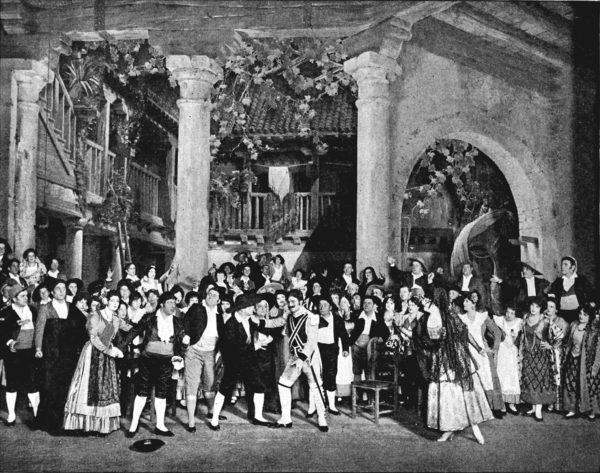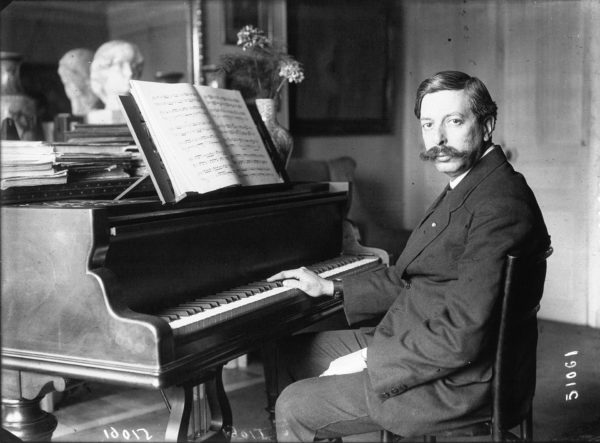Opera CD Review: The Greatest Spanish Opera? — A New Recording of Enrique Granados’s “Goyescas”
By Ralph P. Locke
Why has Granados’s operatic marvel not been staged at the Met since its world-premiere performance there in 1916? Imagine the excitement of experiencing, for the first time, an opera by one of the greatest composers to have come out of the Spanish-speaking world!

A scene from a 1917 staging of Goyescas. Photo: Wiki Common.
GRANADOS: Goyescas (opera)
Nancy Fabiola Herrera, soprano; Lidia Vinyes Curtis, mezzo; Gustavo Peña, tenor; José Antonio López, baritone. BBC Symphony Orchestra and Singers, conducted by Josep Pons.
Harmonia Mundi (France) 902609 — 60 minutes
Click here to buy.
Two months ago I was privileged to attend a very accomplished and moving performance of an opera in Spanish: Il postino, by the late Mexican composer Daniel Catàn (1949-2011). Il postino is based on the much-loved 1994 Italian-language film of the same name about the Chilean poet Pablo Neruda’s period of exile in Italy. The performance was by Virginia Opera, a company (established in 1974) that schleps its simple but effective sets to Norfolk, Richmond, and (where I saw the production) Fairfax. I was astonished to get to know a wonderful composer whose output had entirely escaped me until now, but even more to realize that I had never attended an opera in Spanish. Several of the singers were apparently from Latino families, which perhaps explains why they were able to convey the sung words so effectively. (The opera had received its world premiere in 2010 in Los Angeles, with Plácido Domingo in the role of Neruda.) Indeed, given the substantial Spanish-speaking population of many United States cities today, it would seem that adding an opera in Spanish to a company’s repertory would be one way to “reach out” to a new pool of potential operagoers. And to help non-Latinos such as myself encounter something a bit outside our usual cultural context.
And so to the CD under review. In recent decades, the Met, in New York City, has not, to my knowledge, performed a single opera in Spanish. But back in 1916 it did. Well, here is that work, Goyescas, in a gorgeous new recording.
The Spanish composer-pianist Enrique Granados (1867-1916) is best known today for his marvelous piano pieces and songs. In the operatic world, Granados’s acclaim has long rested on Goyescas, a one-act work — in three “cuadros,” i.e., tableaus — that was originally intended for the Paris Opéra but (because of the desperate situation in Europe during World War I) first reached the stage at the Met in New York. The best-known number from Goyescas is the Intermezzo between tableaus 1 and 2. I grew up loving a 1950s monophonic recording of the Intermezzo, by Carmen Dragon and the Hollywood Bowl Orchestra. (Wow, I just found it again, on YouTube!)
An earlier Granados opera, María del Carmen, received its premiere in 1898. It was last performed in 1900, then disappeared from the stage. The original score was lost and feared destroyed, but it has been recovered and will soon be published in a scholarly edition. The recording and score currently available are based on an extensive revision by the composer’s son Eduardo, made after his father’s death. That recording has been highly praised by critics.

Conductor Josep Pons. Photo: Igor Cortadelias.
The new CD, though, is of his second and last opera, Goyescas. This hour-long work is based on a jealous-love plot similar to the ones in Mascagni’s Cavalleria rusticana, Leoncavallo’s Pagliacci, and Massenet’s La Navarraise. Its biggest oddity is that the music is heavily based on the first five pieces from the suite for solo piano that Granados published under the title Goyescas: Los majos enamorados, plus a separate piece, El pelele, that he later appended to the suite. Thus, various melodic kernels or even entire passages may sound familiar to concertgoers and record collectors. The word “Goyescas” means something like “Pieces [or Scenes] in the Spirit of Paintings by Goya.” The titles of certain pieces from the piano suite are repeated in certain of the scene-headings: for example, the solo in tableau 3 for the soprano Rosario is entitled “The Maja and the Nightingale” (which is the fourth of the piano pieces). The word “maja” referred, in Goya’s day, to a flashily dressed woman from a working-class district, or sometimes an upper-class woman dressed like one. (Granados recorded most of the Goyescas piano pieces, sometimes more than once. Here is his piano-roll recording of the first four pieces; made around 1912, it is marked by an intoxicating flexibility in phrasing and tempo.)
The plot involves tensions between a high-ranking couple — Rosario and Fernando (a captain in the royal guard) — and a lower-ranking couple: Pepa (a true “maja”) and Paquiro (a bullfighter). The couples are differentiated by vocal range: the two fancy folk are a soprano and tenor; the more modest ones, a mezzo and a baritone. The opera, though short, manages to include scene-setting passages for the chorus of townspeople (whose music often quotes one of the piano pieces quite directly), the five-minute Intermezzo, and a four-minute Interlude between the second and third tableaus. The squabbling of the four characters occurs sporadically and economically — no Wagnerian or even Puccinian expansiveness here!
The style of the music is relatively straightforward, avoiding complex chromaticism and often incorporating features of Spanish folk music. The tunes from the piano suite are as gorgeous as ever, and the ways they are moved into different keys and reworked in a variety of ways seems utterly “right” for a work with full orchestra — as if they had been looking for a quasi-symphonic outlet from the start.
But, if I invoke “symphony” here, I do not intend to deny the score’s dramatic merits. In the latter regard, the most powerful passage is probably the duet for the “high” couple, Rosario and Fernando, shortly before the latter goes off to fight the duel to which Paquiro has challenged him (for his having made advances on Pepa). This seven-minute scene is very involving and suggests how much Granados could have accomplished if he had lived longer. It is painful to learn that the composer and his wife died on their voyage back to Europe in 1916 — after the opera’s New York premiere — when their ship was torpedoed by a German submarine.
The new performance is highly accomplished, in ways that reward repeated listening. (It has been uploaded in its entirety to YouTube here and here. I don’t know whether this was done legally and whether the uploads will eventually be taken down.) In particular, the four soloists convey the drama without sacrificing musical beauty. The BBC Chorus sounds extremely well prepared, not least in several extended passages that make the work feel at times like a short oratorio. The recording was made during concert performances at London’s Barbican Concert Hall in January 2018. It is generally well miked, giving a good sense of the work. I had fun “staging” the thing in my mind as I listened.

Composer Enrique Grandos, circa 1914. One of the greatest composers to have come out of the Spanish-speaking world.
Previous recordings conducted by Rafael Frühbeck de Burgos and by Antoni Ros Marbà (the latter with María Bayo and Ramón Vargas) are unavailable at the moment, at least on CD. (I can find a few tracks from the Ros Marbà on Spotify. The whole Ros Marbà performance can currently be heard on YouTube. Also some excerpts, such as the final scene, with Bayo and Vargas.) So the work can be easily tasted. But if you are intrigued to have it on CD — with well-placed track markers and a printed libretto in Spanish and clear English—the new recording is the only game in town, and it’s a good one. The booklet essay is short but informative.
When will operas houses let us not just hear but see Granados’s Goyescas? One could pair it with another wonderful one-act opera, such as Zemlinsky’s startling A Florentine Tragedy (in German, based on a short play by Oscar Wilde) or Bernstein’s tart and tuneful Trouble in Tahiti. Supertitles would remove the problem of hearing a Spanish text. Indeed, I suspect that listeners who are at all accustomed to hearing opera in French or Italian will quickly begin to pick up many words and phrases in Goyescas and find that they aren’t looking at the supertitles all that often.
Imagine the excitement of experiencing, for the first time, an opera by one of the greatest composers to have come out of the Spanish-speaking world!
Ralph P. Locke is emeritus professor of musicology at the University of Rochester’s Eastman School of Music. Six of his articles have won the ASCAP-Deems Taylor Award for excellence in writing about music. His most recent two books are Musical Exoticism: Images and Reflections and Music and the Exotic from the Renaissance to Mozart (both Cambridge University Press). Both are now available in paperback; the second, also as an e-book. He contributes to American Record Guide and to the online arts-magazines NewYorkArts.net, OperaToday.com, and The Boston Musical Intelligencer. His articles have appeared in major scholarly journals, in OxfordMusicOnline (Grove Dictionary), and in the program books of major opera houses, e.g., Santa Fe (New Mexico), Wexford (Ireland), Glyndebourne, Covent Garden, and the Bavarian State Opera (Munich). The present review is freely based on one that he first published in American Record Guide and appears here by kind permission.
Tagged: Goyescas, Granados, Harmonia Mundi, Josep Pons

Goyesca was performed in 1992 in Barcelona and can be viewed on YouTube. It was performed as a concert piece rather than a stage performance. Worth watching/listening to. The video was posted by the principal bassoonist of the Barcelona symphony.